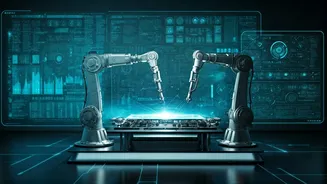The Changing Landscape
Artificial intelligence is not just about replacing human workers; it's driving a fundamental shift in how jobs are structured and the skills that are valued.
Many experts highlight that AI will evolve the nature of work, rather than causing mass unemployment. The focus is shifting towards roles that require uniquely human attributes, such as critical thinking, creativity, and emotional intelligence. The impact is seen across various industries, pushing both employees and employers to adapt to stay competitive. In the years following AI’s advancement, the skill sets needed to thrive are evolving. The article will highlight some of the skills that will be needed to stay competitive.
Valuable Skills Now
As AI takes over more routine tasks, the demand for skills that machines can't easily replicate is increasing. Crucially, complex problem-solving abilities are becoming very valuable, as are skills related to creative thinking and innovation. Another skill that is becoming important is adaptability and the ability to learn new skills quickly. In the technology sector, the ability to work with and manage AI systems is in great demand. The article will provide insights into the skills that are becoming more important in a world shaped by AI.
Adapting to the Change
To succeed in the future job market, continuous learning is essential. This includes developing new technical skills and also strengthening soft skills like communication and collaboration. Professionals must proactively seek opportunities for skill development and upskilling, staying ahead of the curve. Companies must also invest in training and development programs to help their employees adapt. The article stresses the importance of recognizing the changing landscape and actively working to develop skills that are valuable in an AI-driven environment.
The Human Element
While technology continues to advance, the human element remains extremely vital. Empathy, emotional intelligence, and interpersonal skills are irreplaceable. Building strong relationships, understanding diverse perspectives, and effectively communicating ideas will be critical in any role. These abilities enable individuals to work effectively in teams and lead others, especially in complex situations. This section stresses that the skills relating to human interaction will be very important for those looking to compete in this new AI driven environment.
Industry Transformations
Various industries are going through significant transformations because of AI, and these changes impact both jobs and the overall business model. For example, in the healthcare sector, AI is being used to analyze medical images. In the financial sector, AI helps automate tasks, analyze data, and provide personalized financial advice. These changes require professionals to understand the implications of AI within their specific industry. The article will provide insights into how these changes are playing out in different fields and what it means for individuals and organizations.
Preparing for the Future
The future of work will be shaped by the ability of individuals and organizations to adapt to changes. By recognizing these trends and proactively seeking new skills, professionals can position themselves for long-term success. It is also important for organizations to be innovative and creative. This involves fostering a culture of continuous learning and developing strategies that maximize the benefits of AI while addressing the potential challenges. The focus should be on creating a future where technology and human capabilities work in harmony.















